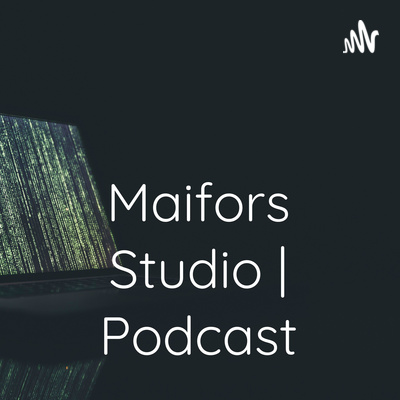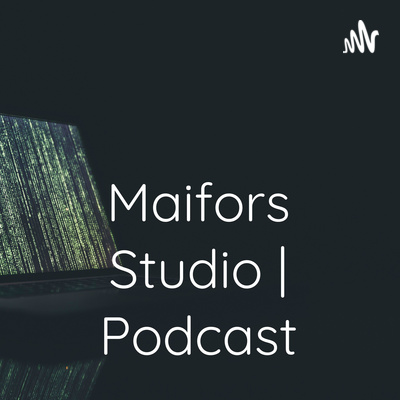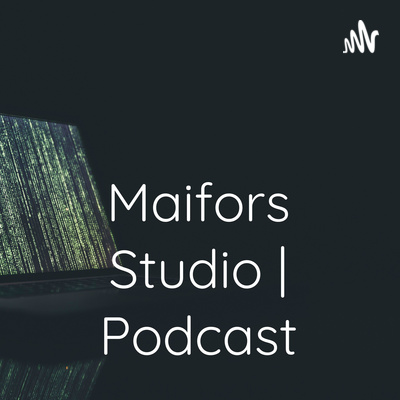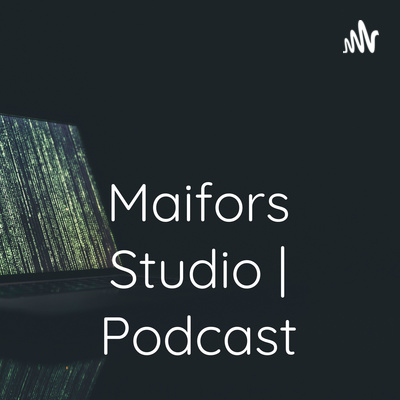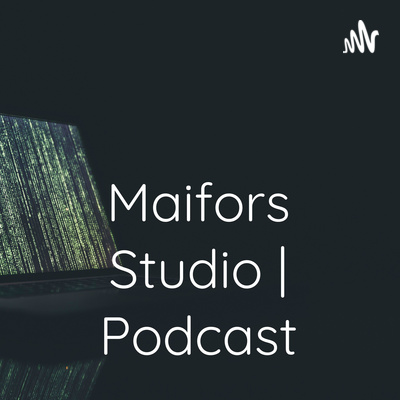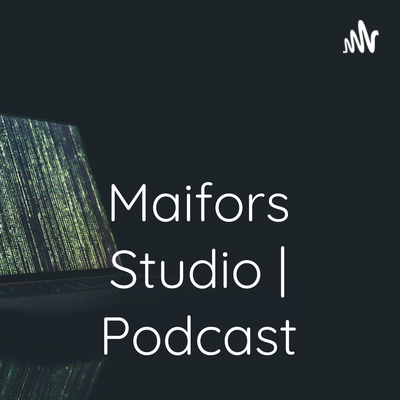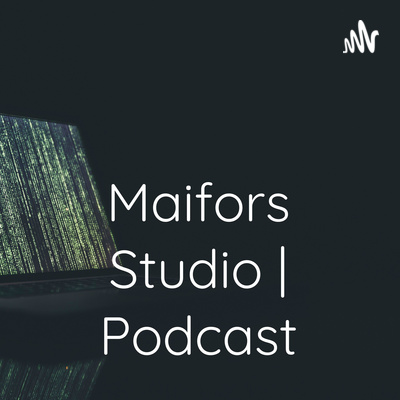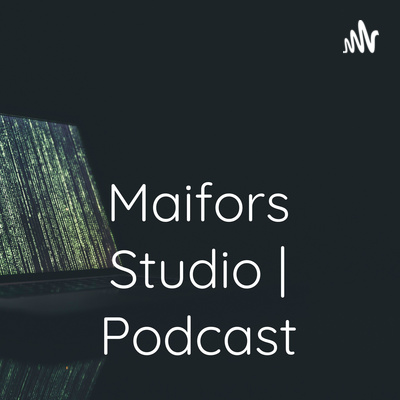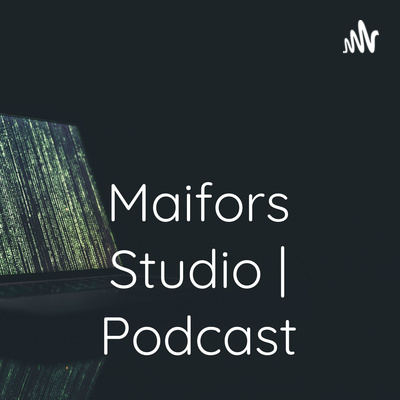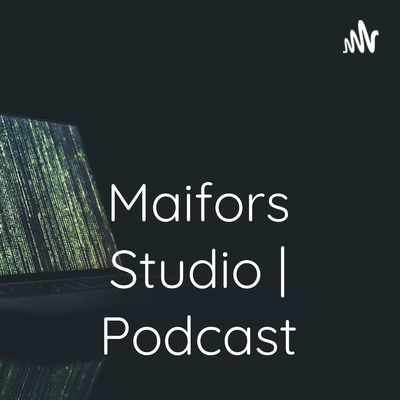Discover Maifors Studio | Podcast
Maifors Studio | Podcast

Maifors Studio | Podcast
Author: Maifors Studio
Subscribed: 0Played: 1Subscribe
Share
© Maifors Studio | Produced by Jauhari Ismail
Description
We plan but | HE plans better
Being Digital | A weekly podcast on digital and spiritual growth Support this podcast: https://anchor.fm/maifors/support
Being Digital | A weekly podcast on digital and spiritual growth Support this podcast: https://anchor.fm/maifors/support
20 Episodes
Reverse
Part 1: How Simulation Can Accelerate Your Digital Transformation.
Around the mahogany tables of corporate boardrooms and the plywood workbenches of garage-based startups, one topic has threatened to monopolize business discussions for years: digital transformation.
Part 2: The New Elements of Digital Transformation
Since 2014, when our article “The Nine Elements of Digital Transformation” appeared in these pages, executive awareness of the powerful and ever-evolving ways in which digital technology can create competitive advantage has become pervasive. But acting on that awareness remains a challenging prospect.
Part 3: When Does It Make Sense to Have Mixed-Mode Meetings?
While organizations are preparing to return large numbers of workers to offices this fall, many senior leaders have questions about how to lead a reassembled workforce when not everyone is together. In a recent article, we put forward a principle to guide the reimagination of hybrid work post-pandemic: Take a virtual-first approach and bring people together physically only when it adds value to do so.
---
This episode is sponsored by
· Anchor: The easiest way to make a podcast. https://anchor.fm/app
Support this podcast: https://anchor.fm/maifors/support
Part 1: Five Creative Ways To Lead A Digital Transformation.
Expert commentary on global affairs for leaders everywhere
Various experiences with digital transformation (DX) projects, including the failures and success stories in organizations, have taught us one thing: digital transformation is about people and not about technology. This argument is now widely accepted as organizations have moved away from focusing on only the technology and off-the-shelf technological solutions to their needs.
Part 2: For digital transformation, ‘mindset matters most’.
Digital transformation has understandably accelerated massively since the Covid-19 pandemic began. Organisations in virtually every industry had to digitise some part of their business or operations in order to carry on throughout the restrictions.
Part 3: Companies Must Find the Courage to Back Up Statements on Climate Action.
The world’s largest companies are rapidly raising the bar on their commitments to tackle climate change. Dozens recently put net-zero goals in place to eliminate carbon from their operations and often their entire value chains as well. Hundreds have committed to using only renewable energy. More than 1,600 say they will cut greenhouse gas emissions at the pace scientists tell us is needed to avoid the worst climate outcomes (that is, they’re pledging a science-based target). And banks, long the laggards on climate action, are funneling trillions of dollars toward clean technologies while moving their investment portfolios away from fossil fuels.
---
This episode is sponsored by
· Anchor: The easiest way to make a podcast. https://anchor.fm/app
Support this podcast: https://anchor.fm/maifors/support
Part 1: Keeping up With Digital Transformation.
Whether or not you have seen The Office (US) (and know that Gabe is annoyed that Andy’s answers are correct because he dislikes him), you probably know that critical thinking questions are used to evaluate a candidate’s thinking process. In fact, the World Economic Forum’s (WEF) The Future of Jobs Report 2020 states that critical thinking is among the top skills employers see as rising in prominence in the lead-up to 2025, along with analysis, problem-solving, and self-management skills.
Part 2: The 5 Fronts of Digital Transformation in the Middle Market.
The past 18 months have brought unprecedented challenges to businesses of all sizes, and the U. S. middle market was not immune.
Part 3: Digital Mindfulness: Being Digital Instead Of Doing Digital.
This saying, often misattributed to Mahatma Gandhi but actually penned by Arleen Lorrance in her book, The Love Project, encapsulates the difference between doing digital stuff and being a digital business.
---
This episode is sponsored by
· Anchor: The easiest way to make a podcast. https://anchor.fm/app
Support this podcast: https://anchor.fm/maifors/support
Part 1: 5 Reasons Your Employees Don’t Understand Your Company’s Vision.
Leadership teams often spend hours wordsmithing their business’ vision, mission, and strategy, only to hear employees complain, “We don’t have a north star. ” Executives are often surprised by this feedback of a lack of an aspirational vision and immediately spend more time trying to craft the perfect statement. This mistaken approach makes scant progress in clarifying their people’s perception of a clear path forward.
Part 2: Digital Mindfulness: Being Digital Instead Of Doing Digital.
This saying, often misattributed to Mahatma Gandhi but actually penned by Arleen Lorrance in her book, The Love Project, encapsulates the difference between doing digital stuff and being a digital business.
Part 3: Five Digital Transformation Hurdles In Financial Services And How To Avoid Them.
Seventy-three percent of digital transformations fail to produce sustained ROI. At least, that’s what a 2018 study found. It’s an astounding figure considering that at the same time, companies are investing more in upgrading their digital offerings. According to a survey of over 2,500 organizations, 97% of company heads said the pandemic accelerated their digital transformation. By 2025, it is estimated that digital transformation will be worth over $1 trillion, up from $470 billion in 2020.
---
This episode is sponsored by
· Anchor: The easiest way to make a podcast. https://anchor.fm/app
Support this podcast: https://anchor.fm/maifors/support
Part 1: The Future of Digital Work Depends On More Than Tech Skills.
Software skills may be essential for much of the work of the 21st century, but candidates also need softer skills to be reliable employees.
Part 2: Informal Leadership Comes at a Cost.
As an informal leader on my team, I’m often responsible not just for meeting my own goals, but also for managing and making decisions on team tasks. Even though these tasks are not mine to complete, I have to put in extra work to help my peers deal with them — and that can be really exhausting.
Part 3: Figuring Out Social Capital Is Critical for the Future of Hybrid Work.
The networks of employee relationships have been depleted during the pandemic, but companies can address this by focusing on three key areas in their return-to-work plans.
---
This episode is sponsored by
· Anchor: The easiest way to make a podcast. https://anchor.fm/app
Support this podcast: https://anchor.fm/maifors/support
Workforce Ecosystems. A New Strategic Approach to the Future of Work.
The latest MIT SMR-Deloitte survey on the future of the workforce finds that most managers consider employees and external workers — including contractors, service providers, app developers, and gig workers — to be part of their workforce. This calls for an integrated approach to workforce management and has led some executives to the idea of a workforce ecosystem. This report discusses the benefits and challenges associated with creating and managing a workforce ecosystem.
---
This episode is sponsored by
· Anchor: The easiest way to make a podcast. https://anchor.fm/app
Support this podcast: https://anchor.fm/maifors/support
Part 1: Strategy as a Way of Life.
Businesses must root strategy in moral purpose to thrive in a complex, rapidly changing world.
Part 2: Why So Many Data Science Projects Fail to Deliver
Organizations can gain more business value from advanced analytics by recognizing and overcoming five common obstacles.
---
This episode is sponsored by
· Anchor: The easiest way to make a podcast. https://anchor.fm/app
Support this podcast: https://anchor.fm/maifors/support
Part 1: Be a Better Leader, Have a Richer Life.
In my research and coaching work over the past two decades, I have met many people who feel unfulfilled, overwhelmed, or stagnant because they are forsaking performance in one or more aspects of their lives. They aren’t bringing their leadership abilities to bear in all of life’s domains—work, home, community, and self (mind, body, and spirit). Of course, there will always be some tension among the different roles we play. But, contrary to common wisdom, there’s no reason to assume that it’s a zero-sum game. It makes more sense to pursue excellent performance as a leader in all four domains—achieving what I call “four-way wins”—not trading off one for another but finding mutual value among them.
Part 2: Choose a few, get started, and adapt.
Coming up with possibilities is an exercise in unbounded imagination. But when it comes time to take action, it’s not practical to try out more than three experiments at once. Typically, two turn out to be relatively successful and one goes haywire, so you will earn some small wins, and learn something useful about leadership, without biting off more than you can chew. Now the priority is to narrow the list to the three most promising candidates by reviewing which will:
Part 3: Preparing for Your First Day Back at the Office.
After the mass exodus from the land of cubicles in 2020, millions are returning to offices in 2021. For those who have relished their commute-free lifestyle, there’s a feeling of dread and a hope for negotiating a permanent remote (or at least hybrid) arrangement. For others who have found working from home challenging, there’s anticipation but still a twinge of uncertainty about how life will work when they’re back at work.
---
This episode is sponsored by
· Anchor: The easiest way to make a podcast. https://anchor.fm/app
Support this podcast: https://anchor.fm/maifors/support
Part 1: Struggling to Solve a Problem? Try Reframing It.
Experts in problem-solving emphasize the importance of deeply understanding the problem before implementing countermeasures. And many cite Charles Kettering’s maxim that “A problem well-framed is a problem half-solved.” But what, precisely, is a “well-framed” problem? I’ve written before about some of the obvious errors to avoid — couching a solution in the form of a problem, and relying on generalities instead of specifics.
Part 2: What Pandemic Parenting Can Teach Us About Leadership.
An executive-coaching client of Sanyin’s recently made an offhand comment that revealed something stunning about parenting over the past year. A busy executive with three kids and an equally busy working spouse, she quipped, “Who knew my kitchen would turn into my executive coach?” When Sanyin asked what she meant, she listed a litany of experiences from around her kitchen table: keeping her kids creatively engaged in their school activities while planning a meal and while, on the other side of the room, her laptop was logged into a virtual strategy session with her team. She reflected, “What I had to learn this past year to keep all my worlds integrated was a crucible I’d never wish on anyone. I know I had it better than many working parents. But I gained some new skills that will serve me well going forward.”
Part 3: Top Digital Banking Transformation Trends for 2021.
When the pandemic hit, most financial institutions entered a crisis mode of building digital capabilities that allowed consumers to the bank without branches. As we enter 2021, banks and credit unions must rethink the definition of 'digital banking,' with the application of data, analytics, technology, innovation, and people that will transform customer experiences.
---
This episode is sponsored by
· Anchor: The easiest way to make a podcast. https://anchor.fm/app
Support this podcast: https://anchor.fm/maifors/support
Part 1: Data: The Fuel That Drives Digital Transformation
The COVID-19 pandemic had a devastating effect on many companies globally. They had to rethink the way they work, how they acquire customers, and how they keep those customers satisfied. Enter: Digital Transformation - the strategy that enabled many of them to do this.
Part 2: How Humans and AI Are Working Together in 1,500 Companies.
Artificial intelligence is becoming good at many “human” jobs—diagnosing disease, translating languages, providing customer service—and it’s improving fast. This is raising reasonable fears that AI will ultimately replace human workers throughout the economy. But that’s not the inevitable, or even most likely, outcome. Never before have digital tools been so responsive to us, nor we to our tools. While AI will radically alter how work gets done and who does it, the technology’s larger impact will be in complementing and augmenting human capabilities, not replacing them.
Part 3: Flexibility.
For Mercedes-Benz executives, inflexible processes presented a growing challenge. Increasingly, the company’s most profitable customers had been demanding individualized S-class sedans, but the automaker’s assembly systems couldn’t deliver the customization people wanted.
---
This episode is sponsored by
· Anchor: The easiest way to make a podcast. https://anchor.fm/app
Support this podcast: https://anchor.fm/maifors/support
Part 1: Overcoming common mistakes in DevOps, agile, and app modernization.
Steeped as we are in corporate DevOps and agile transformation efforts, one of the common questions we get is, “What have other companies struggled with within their transformation attempts and how can we learn from their mistakes?”
Part 2: 7 Best Practices for Working Remotely to Follow in 2021.
Remote working today is well-defined, and it has become a norm for many organizations to manage remote teams and for individuals to work as full-time remote employees.
Part 3: 5 ways to start earning money with the skills you already have.
The CEO of AIrtasker USA says that taking advantage of flexible work allows you to keep an income while you experiment and determine the path you want to take with your career.
---
This episode is sponsored by
· Anchor: The easiest way to make a podcast. https://anchor.fm/app
Support this podcast: https://anchor.fm/maifors/support
Part 1: Who owns digital innovation? Who cares?
These four strategies will help to create a culture of digital innovation with an eye to the future, no matter who’s in charge.
There’s little question that enterprises benefit from a focus on digital innovation. Gartner’s 2021 CIO Agenda Survey found that organizations that increase funding for digital innovation are nearly three times more likely to be leading performers than laggards as compared to their peers.
Part 2: How to Stay Motivated When You’re (Still) Stuck at Home.
After months of being stuck inside due to the COVID-19 pandemic, limiting exposure to friends and family, and juggling responsibilities at home and at work, it’s no surprise that many of us are dealing with frustration, anger, and burnout.
Part 3: 11 Myths About Decision-Making.
From “I like to be efficient” to “I trust my gut” to “I can make a rational decision,” there are a number of deeply ingrained — and counterproductive — myths we tell ourselves about how we make decisions. Underlying these myths are three common and popular...
---
This episode is sponsored by
· Anchor: The easiest way to make a podcast. https://anchor.fm/app
Support this podcast: https://anchor.fm/maifors/support
Part 1: Agile Teams and Waterfall Mindset Management.
The decisions made for the agile teams are always with the help of a confidence vote. The decision made by managers may not be always gain their confidence, which in turn may prohibit the member's full potential. Addressing customer needs or any potential gaps is required to run the agile train most smoothly. A team must know how their actions affect the company's business. If there are any sets of issues arising, team actions should be revised immediately. Not only people engaging in the systems are part of Agile, but other agents may affect the system directly, like props and processes.
Part 2: 10 principles of workforce transformation
How to raise the skills of your employees to meet your digital challenges. See also “A guide to workforce transformation.”
There is a gap between the digital skills people have and those needed to live, learn, and work in the digital world. The need to upskill — to bridge this gap — is a complex problem that will require government administrators, educators, and business leaders to come together. To learn more about upskilling your own workforce, go to Upskill my workforce for the digital world.
Part 3: To Master, The Shift To Digital Leaders Need To Change Themselves.
It is well known that businesses of all sorts are moving down the road towards becoming digital. It is also well known that the pandemic has speeded up the process. Indeed, enterprises that were already making progress in this direction were able to adapt to the changed circumstances and thrive while the less nimble-footed have struggled and will probably continue to do so unless they change their approach and embrace the future.
Thank you for listening. Your support is much appreciated.
---
This episode is sponsored by
· Anchor: The easiest way to make a podcast. https://anchor.fm/app
Support this podcast: https://anchor.fm/maifors/support
Part 1: Toward a Racially Just Workplace
“Happy elephant success is to be measured not so much by the position that one has reached in life as by the obstacles which [one] has overcome while trying to succeed.”
“Success is to be measured not so much by the position that one has reached in life as by the obstacles which [one] has overcome while trying to succeed.”
Part 2:
Thus we turn to the moral case. Many in the U.S. business community have begun to push for more purpose-driven capitalism that focuses not just on shareholder value but also on shared value — benefits that extend to employees, customers, suppliers, and communities. This movement, toward what the University of Toronto’s Sarah Kaplan calls the 360° Corporation, wants corporate leaders to consider both the financial and the ethical implications of all their decisions. We believe that one of its pillars should be proportionate representation and wages for black Americans.
Part 3:
In sum, DandI needs to be an ethos that permeates the entire organization, championed not just by the HR department but by everyone, and especially managers, so that its importance is clear. The Toigo Foundation’s leaders draw a parallel between this idea and the total quality management movement of the 1980s, which, with top-down support and the establishment of key performance indicators, became a pervasive way of working and thinking that filtered down to every function and level.
Thank you for listening. Your support is much appreciated.
---
This episode is sponsored by
· Anchor: The easiest way to make a podcast. https://anchor.fm/app
Support this podcast: https://anchor.fm/maifors/support
Part 1: Best Practices For Working From Home.
Recent economic developments around the world have inspired many businesses to assess or reassess the value of work from home (WFH) employment strategy. Managed well, remote work can bring advantages to team productivity and worker satisfaction.
People who have enjoyed years of remote work opportunities are helping those new to the idea, offering advice based on their own transitions to telecommuting as both employees and managers. There are, of course, challenges associated with working from home. In addition to logistical considerations, there are practical strategies that a person accustomed to office work can learn from telecommuting veterans.
Part 2: Why Pivoting People Is a Strategic Priority
To best prepare their organizations and workforces for post-pandemic changes, leaders should think through a set of critical questions.
Just like post-pandemic physical workspaces will need revising, so too will the skill sets and capabilities of our employees. Yes, leaders absolutely need to reimagine the workplace, but organizations cannot lose sight of the people returning to those spaces. Focusing solely on redesigning the workplace or offering flexible work arrangements (such as remote or hybrid options) without considering employees will hamstring organizations by leaving their people in the lurch.
Part 3: The Enabling Power of Trust
Future of Leadership in the Digital Economy
What will it take to become a great leader in the digital economy? What will be the differentiating skill sets (what individuals will need to do) and mindsets (how they will need to think and behave) that will shed light on what it will take to lead next-generation organizations effectively? We have set out to address these important questions as the foundation for MIT Sloan Management Review’s newest Big Ideas Initiative: The Future of Leadership in the Digital Economy.
Thank you for listening. Your support is much appreciated.
---
This episode is sponsored by
· Anchor: The easiest way to make a podcast. https://anchor.fm/app
Support this podcast: https://anchor.fm/maifors/support
Part 1: Leadership Lessons From Your Inner Child
Future of Leadership in the Digital Economy
When I turned five, I got a new bike. I didn’t know how to ride it, but I took it to a nearby hill anyway, a willing warrior, ready to ride. Was I prepared? Would I be brave enough to overcome the anxiety of facing the unknown? The truth is those questions never occurred to me at the time. Reflecting on this experience decades later, I realized I wasn’t just a willing warrior — I was an ecstatically enthusiastic one. Today, I can’t help but wonder why it seemed so much easier to take on significant new challenges as a five-year-old than it is for me now. As a child, did I have gifts that I somehow lost over the years? Was I foolish then and more responsible now? Upon further reflection, I have come to realize that I’ve been fighting a decades-long battle to not lose many of those gifts that made it relatively easy to learn new things when I was young.
Part 2: What is the role of leadership in digital transformation?
The recent pandemic has demonstrated that, when used effectively, digital transformation can help businesses succeed in even the most trying circumstances.
Part 3: Leaders for a digital transformation
It can be mission-critical for companies to consider the traits, competencies, and drivers of the talent—in-house and external—that will help create their digital future.
Thank you for listening. Your support is much appreciated.
---
This episode is sponsored by
· Anchor: The easiest way to make a podcast. https://anchor.fm/app
Support this podcast: https://anchor.fm/maifors/support
Part 1: SAFe is a marketing framework, not an Agile scaling framework
SAFe sells the illusion you can radically change without leaving your comfort zone
Let’s try to make a list of all the reputable names who support Scaled Agile Framework (SAFe). Think about it. Does anyone come to mind?
Part 2: Why Good Arguments Make Better Strategy
Strategy is hard — really hard — to do well. Many leaders will admit this privately: In an anonymous 2019 survey conducted by Strategyand, 37% of 6,000 executive respondents said that their company had a well-defined strategy, and 35% believed that their company’s strategy would lead to success.
Part 3: Why Good Arguments Make Better Strategy
Great strategies exhibit logical coherence. They are composed of a set of logically interconnected reasons that necessarily produce the conclusion. With a valid argument, if you accept the premises, you must accept the conclusion. With an invalid argument, you run the risk of overlooking critical assumptions and flaws in your reasoning, which in turn can lead to your company’s downfall. Logical formalization ensures validity.
Thank you for listening. Your support is much appreciated.
---
This episode is sponsored by
· Anchor: The easiest way to make a podcast. https://anchor.fm/app
Support this podcast: https://anchor.fm/maifors/support
Part 1: Companies That Obsess Over Velocity Are Clueless About Scrum
Most companies using Scrum spend a lot of time discussing velocity and devising ways to increase it. Velocity becomes a magical, almost mythical number that developers must chase in every Sprint.
Part 2: How to lead a digital transformation — ethically
The fact that COVID-19 accelerated the need for digital transformation across virtually all sectors is old news. What companies are doing to propel success under the circumstances has been under the spotlight. However, how they do it has managed to find a place in the shadows.
Part 3: The 4 Strategies of Digital Transformation
Digital Transformation requires focusing on the aspects that are most crucial to current and anticipated future needs, and clarity to successfully maintain the pace of the transformation as it moves between phases.
Thank you for listening. Your support is much appreciated.
---
This episode is sponsored by
· Anchor: The easiest way to make a podcast. https://anchor.fm/app
Support this podcast: https://anchor.fm/maifors/support
Part 1: 13 Industry Experts Share Reasons Companies Fail At Digital Transformation
While the goal of digital transformation may be to simplify and streamline a company’s workflow, the process itself can be far from easy. A 2020 study by Boston Consulting Group found that a staggering 70% of digital transformation projects fall short of their goals — even when leadership is aligned.
Part 2: Digitizing Isn’t the Same as Digital Transformation
If your organization is busier than ever “digitizing,” you’re not alone. Digital efforts have been proliferating for years as companies strive to catch up with technological innovation. Covid-19 massively accelerated the pace, as many of our most basic activities, from grocery shopping to “going to work” moved online.
Part 3: 10 Industries Where Artificial Intelligence Has Caused a Disruption
Artificial Intelligence (AI) is redefining industries by offering personalization, automating processes, and disrupting how we work. In modern times, AI is embraced by every industry from healthcare to government. Here are the 10 industries where AI has caused a disruption.
Thank you for listening. Your support is much appreciated.
---
This episode is sponsored by
· Anchor: The easiest way to make a podcast. https://anchor.fm/app
Support this podcast: https://anchor.fm/maifors/support
Part 1: Now is the Time to Reassess Digital Transformation Strategy
Around 70% of manufacturing organizations in the U.S. and Europe have adopted a digital transformation (DX) strategy (according to the IDC research). These strategies vary widely in terms of quality and focus. Some companies (but not enough) understand that DX should cover both vertical and horizontal perspectives. Transformation should go beyond factory walls and impact the supply chain, the product and services portfolio, and the revenue side of the business.
Part 2: Digital Disruption will Lead to Growth and Transformation
‘Digital Transformation' is becoming the catchphrase of the technology sphere. Even though it was common among large companies in the past years, the pandemic has now accelerated the digital initiatives across small verticals as well. It is imperative for the business of all sizes starting from small to medium and large size enterprises.
Part 3: Is Digital Transformation the key to Create a Better Sustainable World?
Every industry around the world is reshaped by digital transformation. According to IT advisory and research firm IDC, by 2022, over 60% of global GDP will be digitized, with growth in every sector driven by digitally enhanced offerings, operations, and relationships. At the same time, there are important problems our world is dealing with, such as global warming, natural catastrophes, and other environmental threats. These hazards, along with rising strains on the resources of the planet, are driving mainstream sustainability.
Thank you for listening. Your support is much appreciated.
---
This episode is sponsored by
· Anchor: The easiest way to make a podcast. https://anchor.fm/app
Support this podcast: https://anchor.fm/maifors/support


